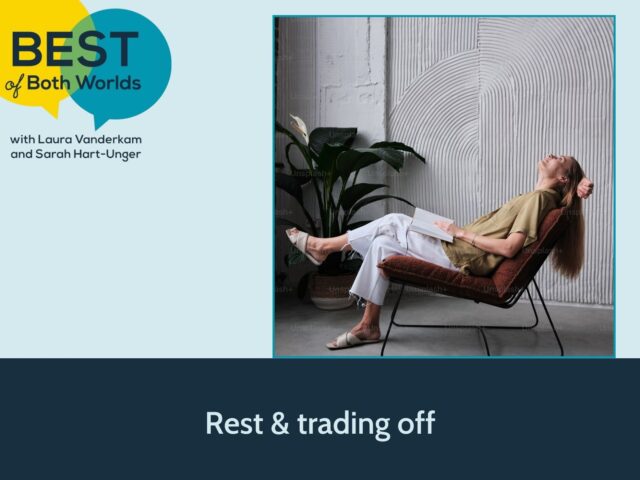There’s a certain narrative out there that working mothers of small kids have zero downtime. From a time diary perspective this is not true. However, what is true is that women tend to have a bit less leisure time than men, parents tend to have less leisure time than non-parents, and people with full time jobs tend to have less leisure time than people who are not currently employed. It is not that working mothers have no leisure time, it’s that they have less than the people around them, and by comparison, this can seem…unfair.
Today’s episode of Best of Both Worlds is both about “rest” (with a broader vision of “rest” to mean downtime in general) and making the rest in any given family fair.
To that end, we advocate that in two parent families with young kids, couples officially trade off who is actively on with the kids during various stretches of non-working hours. This can look different for different families (one party takes Saturday morning, the other takes Saturday afternoon, or maybe one party covers more during the work week and thus gets Saturday “off”). It can be extended to cover longer periods of time too (each party gets a long weekend away for solo travel or travel with friends, for instance).
We answer various objections to this concept, and talk about variations that single parents can adopt.
In the Q&A we address a question from a listener who is looking to get back into the workforce at age 29. She’s young enough that she can do anything, including training for a completely different career. So, what should she do?
Please give the episode a listen! We welcome ratings and reviews. Also, in our Patreon community this week, we’re discussing how a mom with multiple young kids might manage things while her partner is going to be traveling 3 days a week for the next 3 months.


I’m a fall asleep with my book/kindle in my hand person. Normally on my side, and my husband will take away my book, put in a bookmark, wake me to brush my teeth.
@Coree – nice! Yeah, I was having trouble picturing exactly how SHU’s reading turned into a nap – I guess in her case it was always a more active decision…
The episode also made me think of the differences (nuances?) between rest, relaxation, and sleep. To me, resting is sedentary whereas relaxing can be more active. It could just be a matter of semantics. Rest often becomes sleep (SHU on couch, for example!), and some of the things I would do to relax are different than what I would do to rest.
@Amanda- true – I think figuring out what one means by “rest” can certainly help with achieving it.